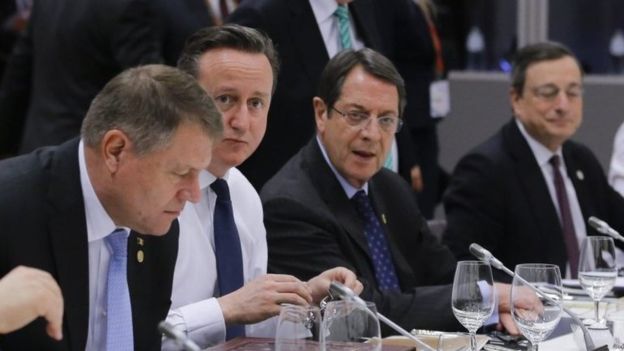
BBC Online: David Cameron says a deal struck with EU leaders will give the UK “special status” and he will campaign with his “heart and soul” to stay in the union. The agreement, reached late on Friday after two days of talks in Brussels, gives the UK power to limit some EU migrants’ benefits. It also includes a treaty change so the UK is not bound to “ever closer union” with other EU member states, he said. EU exit campaigners said the “hollow” deal offered only “very minor changes”. Mr Cameron is set to the announce the date of a referendum on whether Britain should remain in the EU after a cabinet meeting which is happening at 10:00 GMT – the referendum is widely expected to be Thursday, 23 June. Once the date is announced, ministers will be allowed to campaign for whichever side they want – one of Mr Cameron’s closest political allies Michael Gove has already been named as supporting the Leave camp. Others, such as Iain Duncan Smith are expected to follow – but a question mark remains over which way London Mayor Boris Johnson will jump. The key points of the deal are: An “emergency brake” on migrants’ in-work benefits for four years when there are “exceptional” levels of migration. The UK will be able to operate the brake for seven yearsChild benefit for the children of EU migrants living overseas will now be paid at a rate based on the cost of living in their home country – applicable immediately for new arrivals and from 2020 for the 34,000 existing claimantsThe amending of EU treaties to state explicitly that references to the requirement to seek ever-closer union “do not apply to the United Kingdom”, meaning Britain “can never be forced into political integration”The ability for the UK to enact “an emergency safeguard” to protect the City of London, to stop UK firms being forced to relocate into Europe and to ensure British businesses do not face “discrimination” for being outside the eurozone The prime minster had to make concessions to get a deal with the leaders of the 27 other EU members. Mr Cameron had originally wanted a complete ban on migrants sending child benefit abroad but had to compromise after some eastern European states rejected a complete ban and also insisted that existing claimants should continue to receive the full payment. On how long the UK would be able to have a four-year curb on in-work benefits for new arrivals, Mr Cameron had to give way on hopes of it being in place for 13 years, settling for seven instead. The agreement on renegotiating the UK’s EU membership was announced by European Council president Donald Tusk, who tweeted: “Deal. Unanimous support for new settlement for #UKinEU.” German Chancellor Angela Merkel predicted the package of reforms would “elicit support in the UK for the country to remain in the EU”. Mr Tusk said it “strengthens Britain’s special status”, while EU Commission president Jean-Claude Juncker described it as “fair”. Mr Tusk added: “We didn’t walk away from the negotiating table. We were willing to sacrifice part of our interests for the common good, to show our unity. “I deeply believe the UK needs Europe and Europe needs the UK. But the final decision is in the hands of the British people.”

